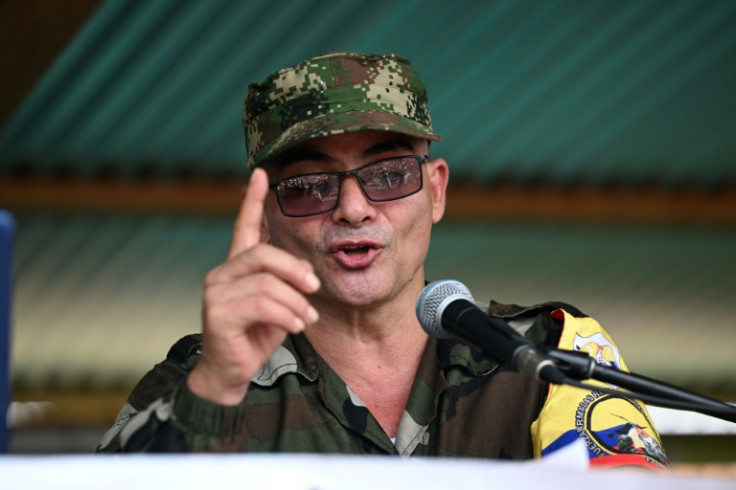Split Among Colombia Guerrillas Strikes Blow To Peace Talks

A top rebel commander has pulled out of Colombia's peace negotiations amid a split in one of the most powerful guerrilla groups in the country, the government said Tuesday.
The divisions within the EMC -- which broke away from the FARC when it signed a 2016 peace deal -- are the latest obstacle to President Gustavo Petro's efforts to negotiate with the country's remaining armed groups.
The guerrilla leader known by the alias Ivan Mordisco "is no longer at the table.... We do not know where he is," the head of the government delegation in the talks, Camilo Gonzalez, said in a statement.
Talks with other Central General Staff (EMC) commanders, who hold sway over troops under their leadership, will continue, however.
Negotiations with the EMC have been plagued by multiple setbacks since they got underway in October 2023.
In March, the government suspended a ceasefire with the EMC in three departments in the southwest of the country after the group violated a truce on multiple occasions, leading to an increase in fighting in the region.
At the time, Petro called Mordisco a "mobster" and "drug trafficker disguised as a revolutionary," and ordered his capture.
Petro has also warned EMC fighters that they could choose the path of notorious drug lord Pablo Escobar -- who was killed by security forces -- or choose "the path of serving the people."
The government and rights groups have accused the EMC of using the ceasefire to expand its territory and increase recruitment efforts.
On Monday, Mordisco appeared in a video warning the government that the future of negotiations depended on the resumption of the truce.
He also claimed that Indigenous communities were joining his "revolutionary army" of their own free will.
Last week, an EMC negotiator and commander, Andrey Avendano, told local media the group was facing "a big division" over differing views on "the political moment in the country."
"There is no large-scale confrontation or difficulty, but some observations have been made," he said.
The government said it would continue dialogue with Avendano, who represents 50 percent of EMC's fighters.
Jorge Mantilla, an expert in armed conflicts, told AFP he expected negotiations to take on a more regional or "territorial" nature.
Another EMC commander, nicknamed Calarca, remains at the negotiating table, but recently said his group would impose "fixed" conditions to the signing of a peace deal, such as the refusal to hand over weapons or submit to a special court.
Nelson Enrique Rios, the commander of the EMC's main faction in the Cauca valley, recently told AFP: "Without weapons, we are nothing. It will be the last thing we give up."
The EMC counts among 3,500 members and is mainly financed through narcotrafficking, according to military intelligence statements.
Since his election in 2022, leftist Petro has sought to put an end to six decades of conflict between the country's security forces, guerrillas, right-wing paramilitaries and drug gangs.
Stop-start negotiations have also been underway with the National Liberation Army (ELN), another guerrilla group operating in the country, which counts almost 6,000 members.
© Copyright AFP 2024. All rights reserved.











